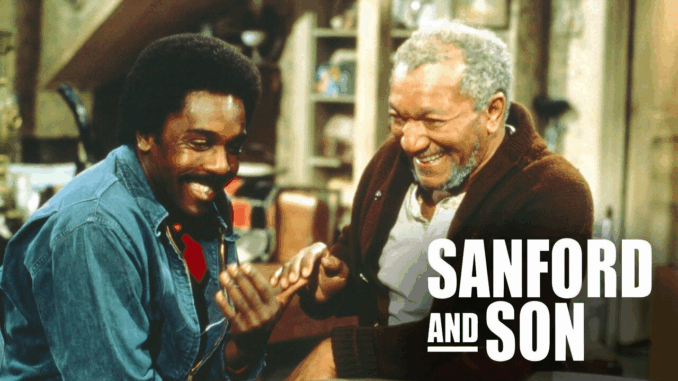
In the history of television, few shows have captured the essence of comedy and humanity with the raw, unfiltered genius of Sanford and Son. More than 50 years after its premiere, the show remains a cultural touchstone, a beloved classic that continues to resonate with new generations of viewers. While the world around it has changed, the hilarious chaos of Fred and Lamont’s junk shop in Watts remains a constant source of laughter and a testament to the show’s enduring power. The question isn’t just why the show is still on the air, but why it is still a sitcom icon after more than five decades.
The answer lies in a perfect storm of comedic genius, groundbreaking storytelling, and a deep, underlying humanity. The show’s success was built on a series of bold, creative risks that proved a sitcom could be both riotously funny and culturally significant. It was a show that was both a product of its time and a blueprint for the future of comedy.
The Comedic Genius of Redd Foxx
The engine of Sanford and Son was its star, the legendary Redd Foxx. A veteran comedian with a sharp, no-holds-barred wit, Foxx brought an unparalleled level of authenticity and comedic timing to the role of Fred Sanford. His on-screen persona was a masterclass in the art of the insult. Fred’s constant, over-the-top verbal sparring with his son, Lamont, and his sister-in-law, Aunt Esther, was the heart of the show’s humor.
Foxx’s delivery of iconic lines like “You big dummy!” was a symphony of comedic brilliance. He could infuse a simple two-word phrase with a lifetime of exasperation and love, making it a powerful and endlessly quotable catchphrase. His physical comedy, particularly his famous fake heart attacks, was a stroke of genius. The phrase “I’m comin’ to join ya, Elizabeth!” became a pop culture phenomenon, a hilarious and theatrical way for Fred to get out of trouble. This perfect blend of verbal and physical comedy is what made Foxx a legend and his character an icon.
The Timeless “Grumpy Old Man” Archetype
Before Fred Sanford, the “grumpy old man” in sitcoms was often a one-dimensional caricature. Fred Sanford changed that forever. He was a complex, contradictory, and deeply human character. He was a lovable curmudgeon who, despite his constant complaints and schemes, was a deeply loving and protective father. His fear of being left alone, and his need to keep his son close, was the emotional core of the show.
This emotional depth is why audiences still connect with Fred Sanford today. We see the humor in his flaws, but we also see the universal human truth in his vulnerability. He was a man who had lost his wife and who was trying to navigate a rapidly changing world, all while holding on to the one person he loved most. The show found humor in this realistic and relatable struggle, making it feel authentic and timeless. This archetype has influenced countless sitcom characters who followed, from George Jefferson in The Jeffersons to Frank Reynolds in It’s Always Sunny in Philadelphia.
The Family Dynamic: A Universal Story
The central relationship between Fred and his son Lamont was a timeless story of generational conflict. Lamont, a young, ambitious man, wanted to leave his father’s junk business and make a name for himself. Fred, an old man set in his ways, wanted to hold on to the past and his son. The show found humor in this simple, yet powerful, dynamic. It was a story of a father and a son who were bound by love but separated by their different views on life.
The show’s ability to find humor in this relatable conflict is a key part of its appeal. The constant bickering over Fred’s junk, his crazy schemes to get rich quick, and Lamont’s attempts to live a normal life are situations that every family can relate to. The show proved that you don’t need a complicated plot to create great comedy; you just need a few well-developed characters and a story that is rooted in a universal human experience.
A Cultural Trailblazer: Breaking Ground for Black Sitcoms
In 1972, television was a very different landscape. Sanford and Son was a cultural trailblazer, as it was one of the first successful sitcoms to center on a predominantly Black cast. The show’s success proved that a Black family’s life could be a source of mainstream entertainment and a ratings powerhouse. It was a massive hit, consistently ranking among the top 10 shows on television.
The show’s success opened the door for a generation of Black sitcoms that would follow, from The Jeffersons to Good Times to Martin. It proved that Black stories were not just a niche market; they were a central part of the American experience. The show’s willingness to use humor to tackle social issues of the time, such as racism, aging, and family, was a bold move that set a precedent for a more honest and culturally aware form of comedy.
The Legacy of a Junk Shop
Ultimately, the genius of Sanford and Son lies in its ability to be a show that is both a product of its time and timeless. It was a show that found humor in the simple, everyday struggles of life, and it proved that a show with a heart could also be a comedy masterpiece. The show’s iconic characters, its witty dialogue, and its timeless themes of family and love will ensure that it remains a sitcom icon for generations to come.